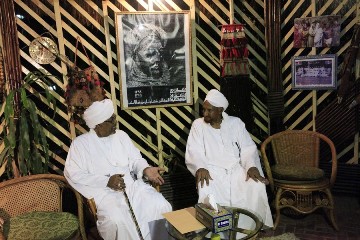Bashir-Mahdi meeting brings nothing new to Sudan’s political landscape
August 27, 2013 (KHARTOUM) – The highly awaited meeting between Sudanese president Omer Hassan al-Bashir and the leader of the National Umma Party (NUP) al-Sadiq al-Mahdi ended without any apparent breakthrough in unraveling what is widely seen as a political deadlock engulfing the East African nation.

Al-Bashir was accompanied by Mustafa Osman Ismail who is the official in charge of NUP dossier at the ruling National Congress Party (NCP).
NUP officials reached by Sudan Tribune offered no details on the discussions between the two men which lasted for an hour and a half.
Al-Mahdi said in brief remarks that he agreed with Bashir that issues of governance and constitution are national ones that should exclude no party or faction and stressed that the two parties will hold consultations in order to reach agreements which he did not specify.
The former Prime Minister also said that they discussed the situation in Egypt and the inevitability of Sudanese intervention to contain the situation there in order to prevent further spiral of violence.
Neither al-Bashir nor al-Mahdi addressed speculations that NUP would join the government.
For years the NUP leader has relentlessly sought to convince the NCP to agree to a constitutional conference between all parties and groups in Sudan.
The ruling party however, brushed aside his efforts and asserted that opposition parties should seek change through the available political mechanisms.
In 2008, al-Mahdi and Bashir signed a deal known as the “national consensus” pact that outlined in details the areas where there is agreement. The latter however proved later to be largely symbolic and al-Mahdi later acknowledged its failure to bring any change.
In recent years, NUP supporters and other opposition parties have grown suspicious of al-Mahdi’s stances which they view as becoming more appeasing of the NCP.
Yesterday several opposition figures expressed disappointment with al-Mahdi-Bashir proposed meeting with some accusing him of playing dual roles with government and opposition.
The NUP leader has reiterated lately that he does not seek regime change but reform thus angering many of his own aides. He has refused to join opposition efforts to mobilize the streets and distanced himself from anti-austerity demonstrations which took place last year.
Critics assert that the former PM has reached a secret deal with the NCP to undermine the opposition in return for appointing his son Abdulrahman, as Bashir’s assistant along with other undisclosed understandings.
Al-Mahdi has warned those within his NUP who oppose his polices to leave and form their own party.
(ST)
